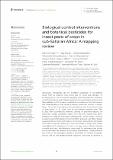| dc.description.abstract | Agricultural productivity can be increased sustainably in sub-Saharan Africa (SSA) by reducing crop losses due to insect pest damage. As an alternative to environmentally-damaging chemical pesticides, biological control interventions and botanical pesticides show potential to achieve both high yields and profits. However, synthesized information of their performance and understanding of their adoption among smallholder farmers is limited. Here, 173 studies of biological control interventions and botanical pesticides of insect pests for 35 crops from 20 sub-Saharan countries from 2005 to 2021 were systematically reviewed. Drawing on published datasets, we found that cereals, particularly maize, were the most studied crop (59%). Research on botanical pesticides constituted 32% of the studies, followed by augmentation/introduction biocontrol (29%), and push-pull (21%). Studies evaluating the technical performance of biocontrol interventions dominated (73%), with a regional clustering of push-pull studies in Kenya. Few studies investigated each intervention on each crop type, across different farming contexts and scales, highlighting an urgent need for landscape-scale studies to elucidate land-use impacts on biocontrol effectiveness. Limited evidence also exists on the synergistic effects of biocontrol on multiple ecosystem services and on non-target/beneficial organisms. We found an absence of interdisciplinary studies that addressed the wider indirect benefits of not using chemical pesticides, the social-economic outcomes, and barriers to adoption by farmers, which we argue are necessary to identify pathways to greater adoption and to support policy advocacy of biocontrol interventions in SSA. | en_US |

